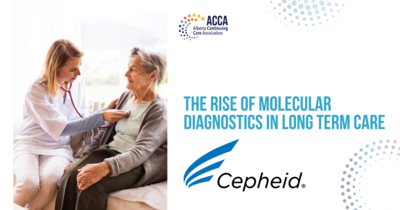The Rise of Molecular Diagnostics in Long Term Care
Nov 20, 2024 Featured
Introduction to Molecular Testing
Molecular diagnostics (MDx) represents a transformative leap in the field of medical testing. Unlike traditional diagnostic methods, which often rely on observing physical symptoms or culturing pathogens, molecular diagnostics pinpoints conditions at the molecular level by detecting specific DNA or RNA sequences. This allows for more precise identification of illnesses, facilitating timely and effective interventions. The cornerstone of MDx lies in its amplification process, which ensures even minuscule amounts of target DNA or RNA are detected, significantly increasing sensitivity compared to other methods.1
Over recent years, molecular testing technology has advanced at a remarkable pace. Innovations such as multiplexing have revolutionized testing by allowing a single sample to be screened for multiple targets simultaneously. Additionally, technological improvements have brought molecular testing out of exclusive, highly specialized lab settings and into point-of-care (PoC) environments, making diagnostics accessible at bedside or in non-traditional healthcare settings. The COVID-19 pandemic accelerated the acceptance and development of PoC molecular testing, showcasing its practicality and necessity in rapidly managing public health.
Learn more about how molecular diagnostics are shaping patient care in our podcast episode 4: ‘Enhancing Respiratory Health in Long Term Care’. Listen now!
Explore more about Molecular diagnostic testing! Click the links to navigate to the information you need:
- Benefits and Advancements in Long Term Care Settings
- Impact on Patient Care
- Challenges in Implementation
- Training and Education
- Future Prospects of Molecular Testing
- Addressing Ethical Concerns
- The Role of Collaboration in Advancing Molecular Testing
Benefits and Advancements in Long Term Care Settings
Aging naturally brings an increased reliance on healthcare, which, for many, includes diagnostic testing. This is particularly true for residents in long term care (LTC) facilities, where the communal nature of living arrangements can facilitate the spread of communicable diseases. Implementing molecular testing at the PoC level in LTC settings can offer significant advantages, including reducing the need for external medical visits and enabling direct, prompt medical decision-making within the facility.
One of the most impactful applications of PoC molecular testing in LTC is for respiratory diseases. With the vulnerability of elderly residents to viral respiratory infections, early detection is critical. Timely identification enables the rapid initiation of treatment protocols and infection prevention and control (IPAC) measures, both of which can contain outbreaks more effectively. In the 2024-2025 season, 31% of outbreaks were recorded in LTC facilities, underscoring the importance of having robust and immediate diagnostic tools on-site[i].
Impact on Patient Care
The ability of molecular diagnostics to detect infections at lower viral loads makes it superior to other common PoC technologies like rapid antigen tests.2 This heightened sensitivity means diseases can be identified at the onset of symptoms, allowing for quicker therapeutic responses and containment efforts. In contrast, tests that must be sent to external labs can take days for results to be returned3, delaying treatment and IPAC measures, which can compromise patient outcomes.
Discover how early detection is transforming care – Listen to the Long Term Forecast episode on Spotify or Apple Podcasts now.
Challenges in Implementation
Despite the clear benefits, implementing molecular testing in long-term care settings does come with challenges that can be grouped into three main categories:
- Cost: The initial investment in testing devices and the recurring expenses for consumables can be substantial.
- Quality Management: Ensuring that LTC staff are properly trained and that test performance is continuously evaluated and documented is crucial for maintaining accuracy.
- Data Management: The integration of test results into medical records and ensuring the proper ownership of post-test data can be complex.
Addressing these challenges requires a multi-faceted approach. Although initial costs may be high, evidence is growing that MDx testing is cost-effective in the long term at a societal level4. For quality management, strong training programs supported by device manufacturers and adherence to local guidelines, such as those provided by the CPSA and Accreditation Canada, can help maintain testing standards.
Training and Education
The training required for LTC staff to properly utilize molecular testing depends on the complexity of the test itself. For a test to be approved for PoC use by Health Canada, it must demonstrate ease of use suitable for non-laboratory personnel. Nevertheless, comprehensive training programs, supplemented by proper documentation, ensure tests are conducted correctly and consistently. LTC facilities should reference local guidelines and leverage manufacturer resources for initial training, while ongoing accreditation standards from organizations such as ISO and Accreditation Canada can help maintain quality.
Future Prospects of Molecular Testing
The next decade is poised to see molecular testing develop along two parallel paths. On one end, we anticipate increasingly complex technologies capable of providing more information from a single sample. On the other, simpler, faster-to-use tests that do not compromise accuracy will continue to emerge, promoting the expansion of decentralized testing networks into remote and resource-limited areas, including LTC facilities.
Explore the future of respiratory health and innovations in diagnostics by watching ‘Enhancing Respiratory Health in Long Term Care’ available now on YouTube.
Addressing Ethical Considerations
One of the primary ethical considerations associated with molecular testing in LTC settings is data ownership, especially in remote or underserved communities. Ensuring that patient data is managed ethically and in line with Canadian healthcare values, such as equitable access to services, requires transparent communication between healthcare providers, patients, families, and policymakers.
The Role of Collaboration in Advancing Molecular Testing
Collaboration among researchers, healthcare providers, policymakers, and other decision-makers is crucial for the continued advancement of molecular diagnostics. The emerging state of PoC MDx for respiratory diseases in LTC facilities highlights the need for more region-specific studies to inform policy and practice. Ensuring that research findings are properly disseminated and utilized will help reinforce the role of molecular testing as an essential tool in public health.
Molecular diagnostics, particularly in point-of-care applications, has the potential to reshape patient care in long-term care facilities by enabling swift, accurate, and comprehensive testing. As technology continues to evolve, fostering collaboration, overcoming implementation challenges, and addressing ethical concerns will be vital to realizing its full potential in improving patient outcomes.
This article is proudly sponsored by Cepheid.
Cepheid is a cutting-edge, global diagnostics company at the forefront of molecular diagnostic innovation. Renowned for their state-of-the-art technology, Cepheid delivers rapid and highly accurate testing solutions for a broad spectrum of conditions, including Flu, RSV, and Covid-19. Their groundbreaking system – the GeneXpert Xpress – acclaimed for its ease of use and reliability, is transforming patient care and public health at the point-of-care on a global scale.
Have questions or want to learn more?
Visit the Long Term Care Canada website at https://www.simpler.cepheid.ca
Reach out to Sarah at sarah.garringer@cepheid.com for specific inquiries.
Listen to The Long Term Forecast podcast episode, ‘Enhancing Respiratory Health in Long Term Care,’ to dive deeper into this important topic. Listen now!
[i] https://www.alberta.ca/stats/dashboard/respiratory-virus-dashboard.htm?data=outbreaks#outbreaks
1&2 Mak GC, Lau SS, Wong KK, Chow NL, Lau CS, Lam ET, Chan RC, Tsang DN. Analytical sensitivity and clinical sensitivity of the three rapid antigen detection kits for detection of SARS-CoV-2 virus. J Clin Virol. 2020 Dec;133:104684. doi: 10.1016/j.jcv.2020.104684. Epub 2020 Oct 29. PMID: 33176236; PMCID: PMC7598567.
3 Bibby, H.L., de Koning, L., Seiden-Long, I. et al. A pragmatic randomized controlled trial of rapid on-site influenza and respiratory syncytial virus PCR testing in paediatric and adult populations. BMC Infect Dis 22, 854 (2022). https://doi.org/10.1186/s12879-022-07796-3
4 Davies S, Boller E, Chase J, Beaubrun A, Miller C, Jensen I. A cost-consequence analysis of the Xpert Xpress CoV-2/Flu/RSV plus test strategy for the diagnosis of influenza-like illnesses. J Med Econ. 2024 Jan-Dec;27(1):430-441. doi: 10.1080/13696998.2024.2313391. Epub 2024 Mar 11. PMID: 38328858.

